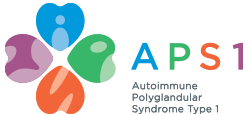APS Type 1 Families and Friends,
As a national emergency was announced in the US yesterday, the Foundation is taking this moment to make sure we are doing everything we can to help ensure the safety and health of our APS Type 1 Family.
We’re sure you have received a lot of communications regarding how to manage through this pandemic situation. As you know, early evidence suggests that COVID-19 has a far greater impact on older people and people with severe underlying health conditions. Our group fits the latter category (lucky us). Below are links to the CDC and WHO for individuals with compromised immune systems and added some personalized directions for our community specifically from Dr. Lionakis who actively cares and treats over 100 APS Type 1 patients at the NIH.
https://www.cdc.gov/coronavirus/2019-ncov/specific-groups/high-risk-complications.html
https://www.who.int/emergencies/diseases/novel-coronavirus-2019
From Dr. Lionakis at the NIH specifically for our APS Type 1 Community…
Generally:
- The basics (the CDC website provides a very good overview and details on these: https://www.cdc.gov/coronavirus/2019-ncov/about/prevention.html)
- Clean your hands often with water and soap for at least 20 seconds. Alternative acceptable means of hand hygiene are presented in the CDC website above (e.g., alcohol-based hand sanitizer).
- Avoid crowds, travel, and sick contacts as much as possible.
- Avoid touching surfaces in public spaces.
- Avoid touching your mouth, eyes or nose with unwashed hands.
- If you become ill, especially with fever, cough or shortness of breath, notify your local health care team as soon as possible, to determine the need for testing for COVID-19. Do not wait for these symptoms to get worse before notifying your local health care team. If you are to be seen in the ER or by a health care provider who does not know you or your history, mention to him/her that you suffer from an autoimmune disease, so that the provider becomes aware of the condition when he/she makes an assessment for the need to proceed with SARS-CoV-2 depending on the clinical presentation.
- If you are diagnosed with COVID-19, please notify Dr. Lionakis immediately.
For Adrenal Insufficiency:
- Stress dose steroids at fever onset, to be continued for 24 hours after last fever resolves.
- Maintain hydration.
- If you are unable to take your steroids by mouth due to nausea/vomiting or other reason, use your injectable Solucortef and you must proceed to be evaluated at a tertiary care center immediately
For Hypoparathyroidism:
- Your calcium requirement may change with illness and you should be aware of signs of hypo/hypercalcemia.
- Notify your local endocrinologist to develop a plan of action based on your specific calcium needs in prior illnesses and your endocrinologist’s knowledge of your individual history.
- Maintain hydration.
- For any signs of hypo/hypercalcemia or if you are unable to take your medications, you must proceed to be evaluated at a tertiary care center immediately.
Please make sure you follow your physician’s guidelines and have your emergency shots and hospital letters ready in case this virus reaches your family, which we hope it does not. Our thoughts and prayers are with you all. Be vigilant on taking appropriate action to prevent the spread of this virus.
If there is anything we can do to support you, please don’t hesitate to reach out to us. We will get through this together!
Todd Talarico
President, APS Type 1 Foundation
todd.talarico@apstype1.org

